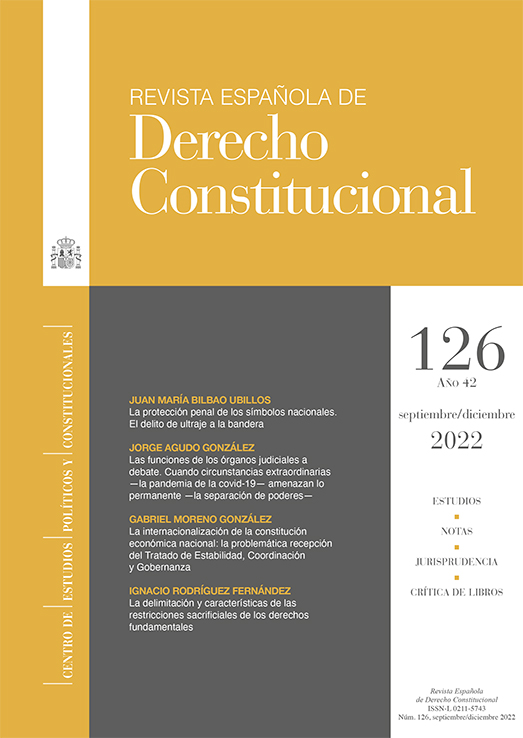Constitution and amnesty
DOI:
https://doi.org/10.18042/cepc/redc.131.0Abstract
The thesis that will be defended in this study is that the Cortes Generales not only do not have the exceptional power to grant amnesties constitutionally attributed, but that from a systematic interpretation of the Constitution it is possible to deduce the existence of an implicit prohibition of amnesty. Firstly, the constituent debated and expressly rejected the possibility of including the granting of amnesties as a power of the Cortes Generales. Secondly, the inclusion in the Constitution of an express prohibition on granting general pardons must be interpreted as an implicit prohibition on granting amnesties. Thirdly, the amnesty contradicts basic principles of the rule of law such as equality in the application of the law and the exclusivity of the judicial power to judge and enforce what is judged. These principles can only be excepted if there is an express constitutional authorization.
Downloads
Published
How to Cite
Issue
Section
License
En el momento en que una obra es aceptada para su publicación, se entiende que el autor cede a la REDC en exclusiva los derechos de reproducción, distribución y venta de su manuscrito para su explotación en todos los países del mundo en formato de revista de papel, así como en cualquier otro soporte magnético, óptico y digital.
Los autores cederán también a la REDC los derechos de comunicación pública para su difusión y explotación a través de intranets, internet y cualesquiera portales y dispositivos inalámbricos que decida el editor, mediante la puesta a disposición de los usuarios para consulta online de su contenido y su extracto, para su impresión en papel y/o para su descarga y archivo, todo ello en los términos y condiciones que consten en la web donde se halle alojada la obra.
A su vez, la REDC autoriza a los autores de los trabajos publicados en la revista a que ofrezcan en sus webs personales o en cualquier repositorio de acceso abierto una copia de esos trabajos una vez publicados; junto con esa copia ha de incluirse una mención específica de la REDC, citando el año y el número de la revista en que fue publicado y añadiendo el enlace a la web de la REDC.
Pasado un año desde su publicación, los trabajos de la REDC quedarán bajo la licencia de Creative Commons Reconocimiento-NoComercial-SinObraDerivada 4.0 España (CC BY-NC-ND 4.0 ES), que implica que el artículo y la nota de investigación pueda copiarse, distribuirse y comunicarse públicamente con la única restricción de que en los créditos se reconozca explícitamente al autor y la obra bajo la forma establecida por éste, sin derecho a su explotación comercial y la elaboración de obras derivadas.
Prácticas deshonestas: plagio y fraude científico
A efectos de lo estipulado en la Ley de Propiedad Intelectual respecto a las acciones y procedimientos que puedan emprenderse contra quien infrinja los derechos de propiedad intelectual, la publicación de un trabajo que atente contra dichos derechos será responsabilidad de los autores, quienes en consecuencia asumirán los eventuales litigios por derechos de autor y fraude científico.
- Presentar el trabajo ajeno como propio.
- Adoptar palabras o ideas de otros autores sin el debido reconocimiento.
- No emplear las comillas u otro formato distintivo en una cita literal.
- Dar información incorrecta sobre la verdadera fuente de una cita.
- El parafraseo de una fuente sin mencionar la fuente.
- El parafraseo abusivo, incluso si se menciona la fuente.
Las prácticas constitutivas de fraude científicoson las siguientes:
- Fabricación, falsificación u omisión de datos y plagio.
- Publicación duplicada.
- Conflictos de autoría.


